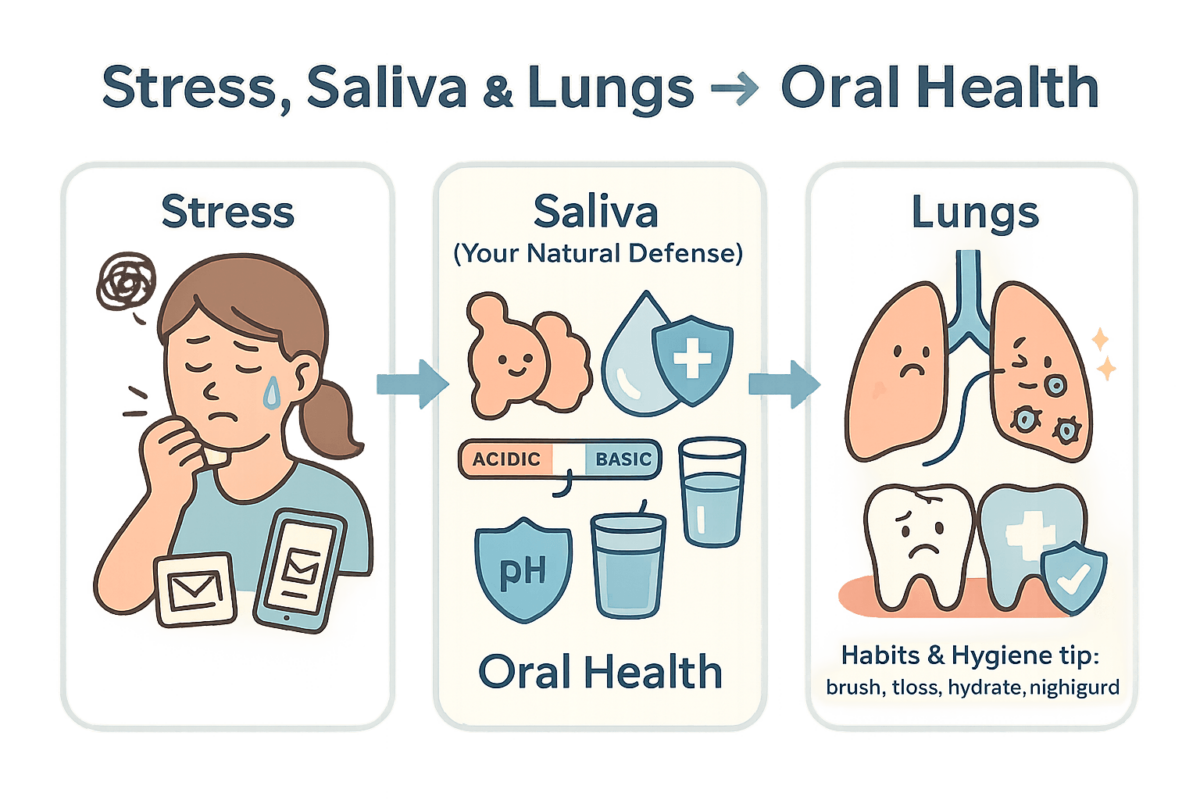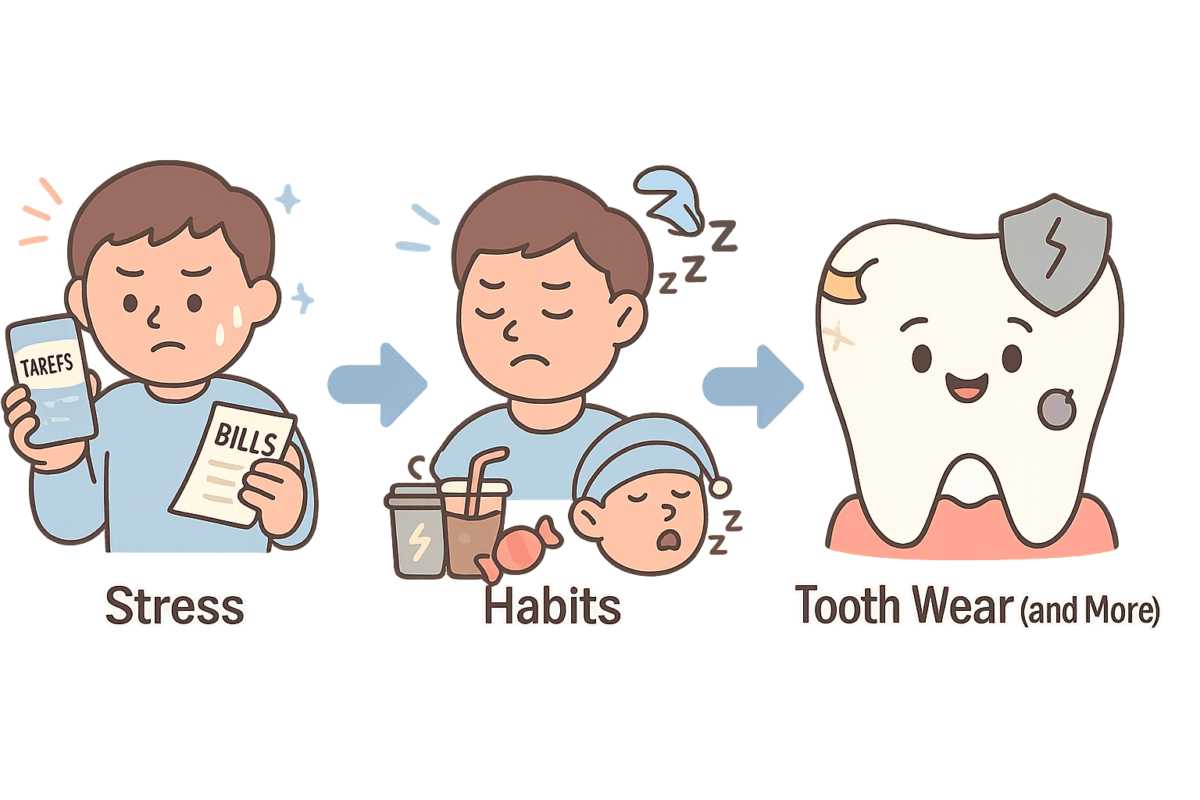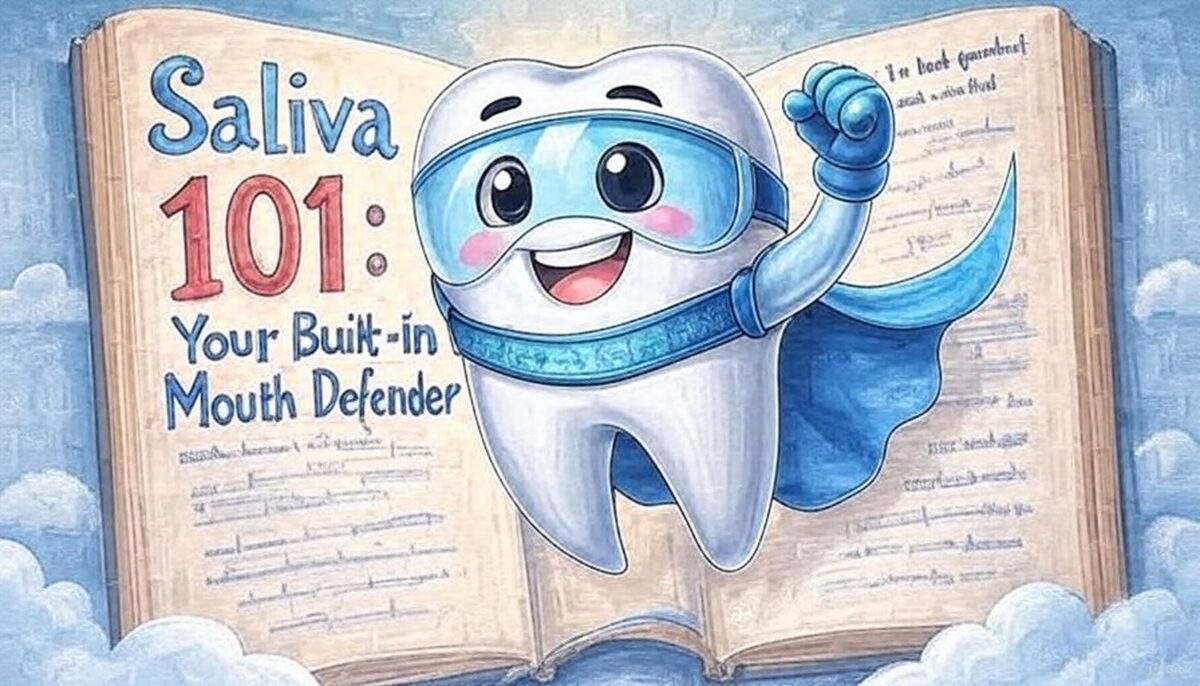Can Tariffs Mess with Your Teeth?

By Dr. Bobby Bhakri – Bob’s Your Dentist, Heartland Dental Centre, Mississauga, Ontario
(What Stress, Saliva, and Your Lungs Have to Do With Oral Health)
The other day a patient jokingly asked, “Doc, do tariffs mess up people’s teeth?” We had a laugh and then I said, “Actually, indirectly, maybe.” Not because customs fees sneak into your mouth, but because stress does. When we’re anxious (about money, news, work, pick your poison), our habits and body chemistry shift in little ways that can add up inside the mouth. Here’s the short story of how stress can nudge saliva, teeth, and even lungs and what to do about it.
- Stress and anxiety are linked with jaw clenching/grinding (bruxism) and can reduce salivary flow, both raise risks for cracked/worn teeth, cavities, and gum inflammation.
- Saliva isn’t “just blood,” but a specialized fluid made by your salivary glands; when flow drops or pH trends lower, cavity and erosion risk go up.
- Poor oral hygiene increases the chance that mouth bacteria reach the lungs and contribute to pneumonia, especially in older adults or people with swallowing issues. Good oral care reduces that risk.
- Lung-transplant recipients are encouraged to maintain routine dental care; timing and antibiotics should be coordinated with the transplant team (often no elective care for 3–6 months post-op).

Stress → Habits → Tooth Wear (and More)
When life gets tense, many of us clench or grind our teeth—often without realizing it. Dentists across North America reported a surge in stress-related conditions like grinding, cracked teeth, and TMJ symptoms during the pandemic, a trend that has stayed elevated.
Awake bruxism, in particular, is tied to emotions like anxiety, stress, anger, or tension. Over time, grinding can chip enamel, fracture teeth, inflame jaw joints, and make teeth sensitive. If you’re catching yourself clenching at the computer or in traffic, that’s your cue to intervene.
Stress can also affect saliva. Research links stress, anxiety, and depression with reduced unstimulated salivary flow and subjective dry mouth (xerostomia)—a combo that raises cavity and gum-disease risk.
Quick reality check on “acidic blood”: your blood pH is tightly controlled between ~7.35–7.45. Day-to-day anxiety won’t swing it far. The bigger oral risk is dry mouth and behavior change (grinding, mouth breathing, snacking), not chronically “acidic blood.”
Saliva 101: Your Built-In Mouth Defender
Saliva is produced by your salivary glands (not simply “refined blood”). It’s >99% water plus protective proteins, enzymes, and buffers. As saliva moves through gland ducts, its composition is actively tweaked—nature’s own mouthwash and shock absorber.
Classic reviews emphasize that saliva isn’t a mere plasma ultrafiltrate; it’s a specialized secretion. Either way, the takeaway is the same: when flow drops, defenses drop.
Why it matters:
- Low salivary flow and low resting pH are associated with higher caries rates, especially in older adults.
- Persistent dry mouth (xerostomia) raises risks for cavities, gum disease, fungal infections, and enamel erosion.
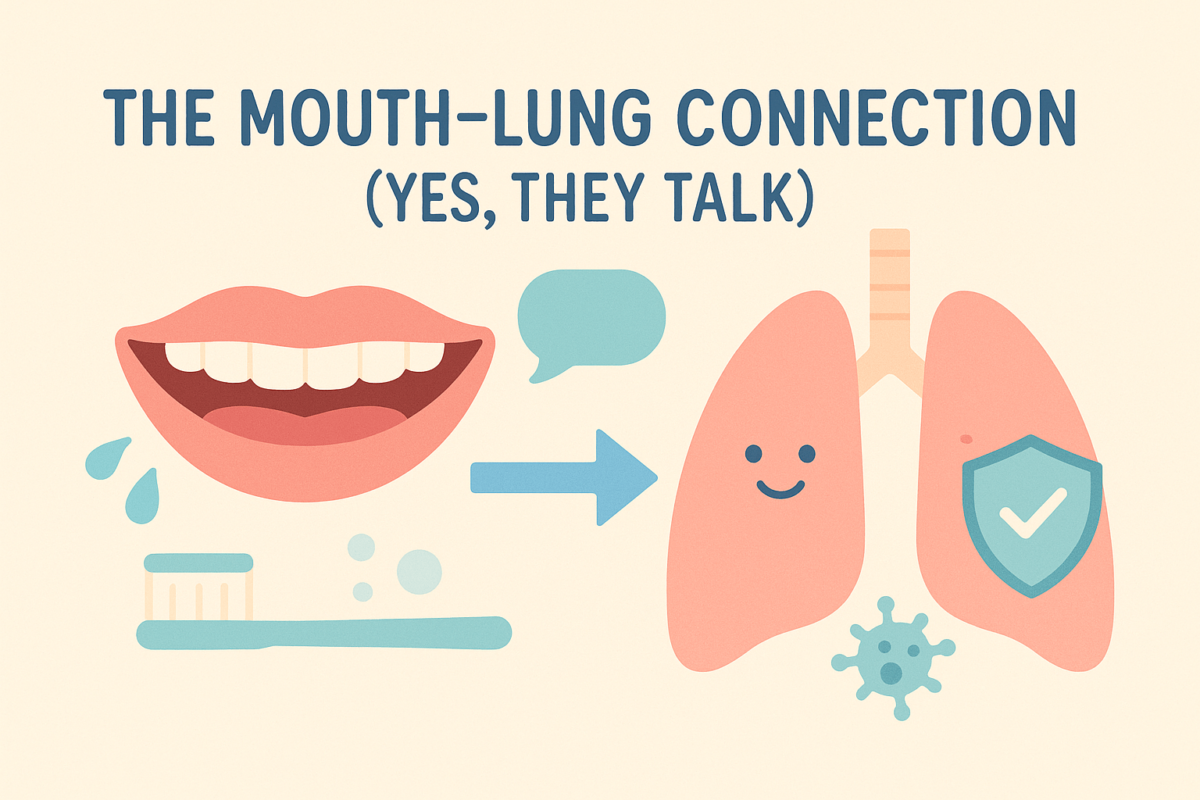
The Mouth–Lung Connection (Yes, They Talk)
We swallow saliva all day. In vulnerable people (frail, reflux, swallowing problems), oral bacteria can be aspirated toward the lungs and contribute to pneumonia. Here’s the important part: better oral hygiene lowers pneumonia risk in high-risk groups. Systematic reviews of nursing-home residents show that improved daily brushing and professional care reduce pneumonia incidence and may prevent roughly 1 in 10 pneumonia-related deaths.
Large population data also link more dental disease with higher pneumonia risk—and, conversely, frequent tooth-brushing and regular professional cleanings with lower risk.
Mechanistically, poor oral hygiene increases pathogenic biofilms that can be inhaled; keeping plaque under control reduces that microbial burden.
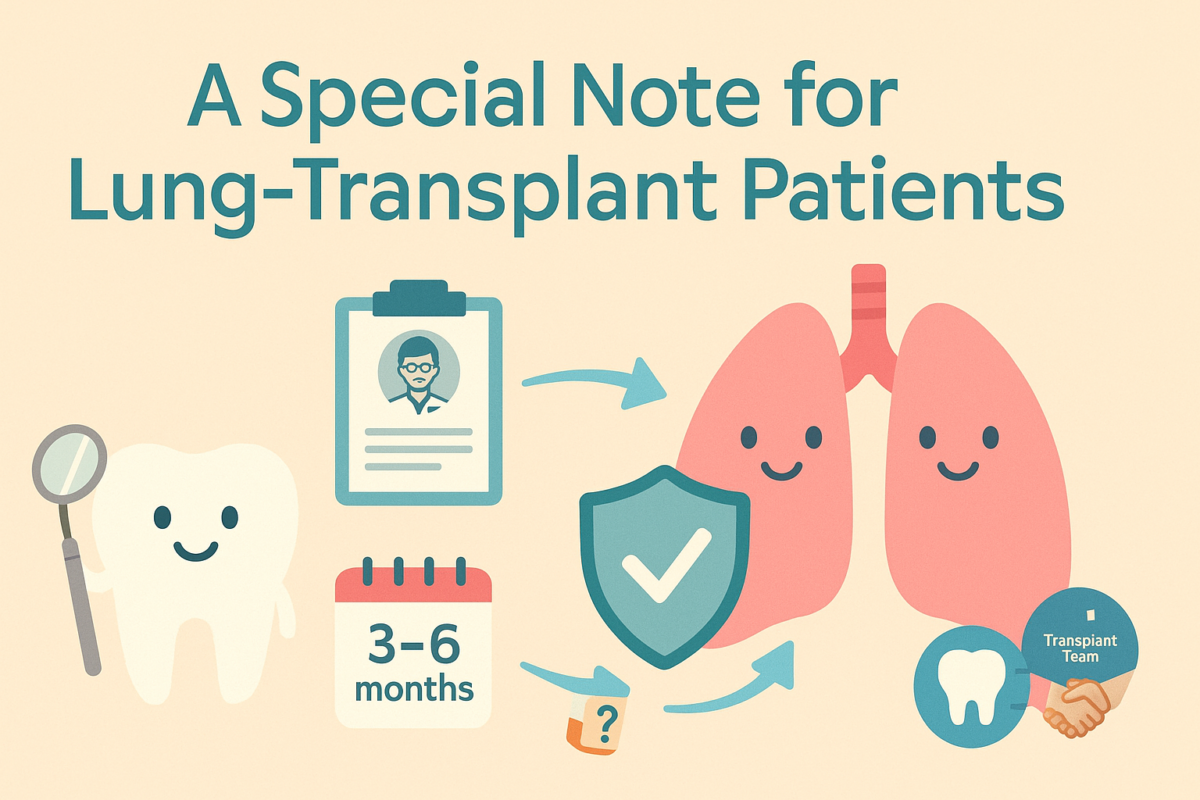
A Special Note for Lung-Transplant Patients
If you’ve had (or are awaiting) a lung transplant, oral health is part of your overall care plan:
- Timing matters: most teams defer elective dental procedures for 3–6 months after transplant while immunosuppression is highest.
- Antibiotics: whether you need pre-procedure antibiotics is case-by-case and should be decided with your transplant team. Routine prophylaxis is not automatic for everyone.
- Maintenance is encouraged: routine hygiene visits and excellent home care help reduce oral infection risks that could complicate recovery. (Hospitals and transplant guidelines echo this emphasis.)
What You Can Do (Starting Today)
- Tackle daytime clenching. Put a sticky note on your screen: Tongue up, teeth apart, lips together. If you wake with jaw soreness or headaches, ask us about a custom nightguard.
- Keep saliva flowing. Hydrate, chew sugar-free gum (xylitol), limit frequent sipping of acidic drinks, and manage meds that dry the mouth (talk to your MD before changing anything).
- Brush and clean between daily. For older adults or caregivers, consistent daily brushing plus denture cleaning makes a real difference in pneumonia risk.
- Breathe through your nose when possible. Mouth breathing dries tissues and can worsen caries risk; address allergies, congestion, or sleep issues with your physician.
- If you’re immunosuppressed or a transplant recipient: keep regular dental follow-ups and coordinate procedures with your transplant team.
The Bottom Line
Whether it’s tariffs, timelines, or toddlers, stress shows up in the mouth—through clenching, saliva changes, and habits that chip away at oral health. The same plaque that irritates gums can also add risk to the lungs in vulnerable folks. Keep the system healthy, and the pieces (teeth, gums, lungs) work better together.
If you’re in the GTA and want a personalized plan, we’d be happy to help at Heartland Dental Centre in Mississauga, from bruxism and dry-mouth strategies to routine hygiene and post-transplant coordination.
You Can Watch My Video Here:

